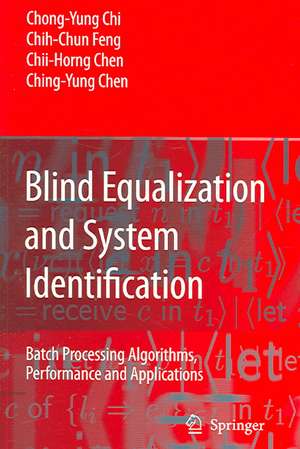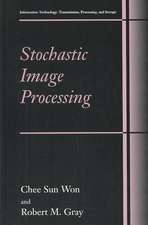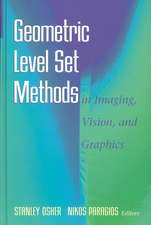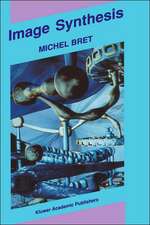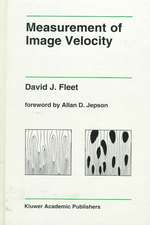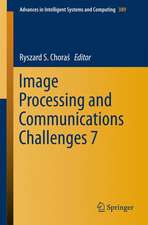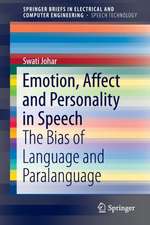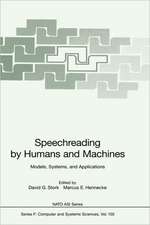Blind Equalization and System Identification: Batch Processing Algorithms, Performance and Applications
Autor Chong-Yung Chi, Chih-Chun Feng, Chii-Horng Chen, Ching-Yung Chenen Limba Engleză Paperback – 12 dec 2005
This is a textbook for graduate courses in discrete-time random processes, statistical signal processing, and blind equalization and system identification. It contains material which will also interest researchers and engineers working in digital communications, source separation, speech processing, and other, similar applications.
Preț: 401.42 lei
Nou
Puncte Express: 602
Preț estimativ în valută:
76.81€ • 80.40$ • 63.93£
76.81€ • 80.40$ • 63.93£
Carte tipărită la comandă
Livrare economică 31 martie-14 aprilie
Preluare comenzi: 021 569.72.76
Specificații
ISBN-13: 9781846280221
ISBN-10: 1846280222
Pagini: 484
Ilustrații: XIV, 469 p. 112 illus.
Dimensiuni: 155 x 235 x 29 mm
Greutate: 0.73 kg
Ediția:2006
Editura: SPRINGER LONDON
Colecția Springer
Locul publicării:London, United Kingdom
ISBN-10: 1846280222
Pagini: 484
Ilustrații: XIV, 469 p. 112 illus.
Dimensiuni: 155 x 235 x 29 mm
Greutate: 0.73 kg
Ediția:2006
Editura: SPRINGER LONDON
Colecția Springer
Locul publicării:London, United Kingdom
Public țintă
ResearchCuprins
Mathematical Background.- Fundamentals of Statistical Signal Processing.- SISO Blind Equalization Algorithms.- MIMO Blind Equalization Algorithms.- Applications of MIMO Blind Equalization Algorithms.- Two-Dimensional Blind Deconvolution Algorithms.- Applications of Two-Dimensional Blind Deconvolution Algorithms.
Notă biografică
Doctor Chong-Yung Chi is a Professor with the Department of Electrical Engineering, National Tsing Hua University, Taiwan. From July 1983 to September 1988, he was with the Jet Propulsion Laboratory, Pasadena, California, where he worked on the design of various spaceborne radar remote sensing systems including radar scatterometers, SAR’s, altimeters, and rain mapping radars. From October 1988 to July 1989, he was a visiting specialist at the Department of Electrical Engineering, National Taiwan University, Taipei, Taiwan, RoC. Since August 1989, Professor Chi has been a Professor with the Department of Electrical Engineering and since August 2002, the Chairman of Institute of Communications Engineering at the National Tsing Hua University, Hsinchu, Taiwan. He was a visiting researcher, at the Advanced Telecommunications Research Institute International, Kyoto, Japan, in May and June 2001. He has published more than 110 technical papers in radar remote sensing, system identification and estimation theory, deconvolution and channel equalization, digital filter design, spectral estimation, and higher-order statistics-based signal processing. His research interests include signal processing for wireless communications, statistical signal processing and digital signal processing and their applications.
Dr. Chi is a member of the Society of Exploration Geophysicists, the European Association for Signal Processing, and an active member of the Chinese Institute of Electrical Engineering. He has served on numerous symposium and conference boards and is currently an Associate Editor for the IEEE Transactions on Signal Processing and an Editorial Board Member EURASIP Journal on Applied Signal Processing.
Doctors Chih-Chun Feng and Ching-Yung Chen are engineers with the Transmission Technology Department, Digital Vedio and Optical Communiations Technologies Division, Computer and Communications Research Laboratories, Industrial TechnologyResearch Institute, Taiwan. They are engaged in developing digital communication systems and algorithms which focus on baseband signal processing design.
Doctor Chii-Horng Chen is an engineer with ADMtek Incorpolated, Taiwan. He is engaged in developing signal processing algorithms for IEEE 802.11b/a/g/h WLAN baseband systems.
Dr. Chi is a member of the Society of Exploration Geophysicists, the European Association for Signal Processing, and an active member of the Chinese Institute of Electrical Engineering. He has served on numerous symposium and conference boards and is currently an Associate Editor for the IEEE Transactions on Signal Processing and an Editorial Board Member EURASIP Journal on Applied Signal Processing.
Doctors Chih-Chun Feng and Ching-Yung Chen are engineers with the Transmission Technology Department, Digital Vedio and Optical Communiations Technologies Division, Computer and Communications Research Laboratories, Industrial TechnologyResearch Institute, Taiwan. They are engaged in developing digital communication systems and algorithms which focus on baseband signal processing design.
Doctor Chii-Horng Chen is an engineer with ADMtek Incorpolated, Taiwan. He is engaged in developing signal processing algorithms for IEEE 802.11b/a/g/h WLAN baseband systems.
Textul de pe ultima copertă
Discrete-time signal processing has had a momentous impact on advances in engineering and science over recent decades. The rapid progress of digital and mixed-signal integrated circuits in processing speed, functionality and cost-effectiveness has led to their ubiquitous employment in signal processing and transmission in diverse milieux.
The absence of training or pilot signals from many kinds of transmission – in, for example, speech analysis, seismic exploration and texture image analysis – necessitates the widespread use of blind equalization and system identification. There have been a great many algorithms developed for these purposes, working with one- or two-dimensional (2-d) signals and with single-input single-output (SISO) or multiple-input multiple-output (MIMO), real or complex systems. It is now time for a unified treatment of this subject, pointing out the common characteristics and the sometimes close relations of these algorithms as well as learning from their different perspectives. Blind Equalization and System Identification provides such a unified treatment presenting theory, performance analysis, simulation, implementation and applications.
Topics covered include:
• SISO, MIMO and 2-d non-blind equalization (deconvolution) algorithms;
• SISO, MIMO and 2-d blind equalization (deconvolution) algorithms;
• SISO, MIMO and 2-d blind system identification algorithms;
• algorithm analyses and improvements;
• applications of SISO, MIMO and 2-d blind equalization/identification algorithms.
Each chapter is completed by exercises and computer assignments designed to further understanding and to give practical experience with the algorithms discussed.
This is a textbook for graduate-level courses in discrete-time random processes, statistical signal processing, and blind equalization and system identification. It contains materialwhich will also interest researchers and practicing engineers working in digital communications, source separation, speech processing, image processing, seismic exploration, sonar, radar and other, similar applications.
The absence of training or pilot signals from many kinds of transmission – in, for example, speech analysis, seismic exploration and texture image analysis – necessitates the widespread use of blind equalization and system identification. There have been a great many algorithms developed for these purposes, working with one- or two-dimensional (2-d) signals and with single-input single-output (SISO) or multiple-input multiple-output (MIMO), real or complex systems. It is now time for a unified treatment of this subject, pointing out the common characteristics and the sometimes close relations of these algorithms as well as learning from their different perspectives. Blind Equalization and System Identification provides such a unified treatment presenting theory, performance analysis, simulation, implementation and applications.
Topics covered include:
• SISO, MIMO and 2-d non-blind equalization (deconvolution) algorithms;
• SISO, MIMO and 2-d blind equalization (deconvolution) algorithms;
• SISO, MIMO and 2-d blind system identification algorithms;
• algorithm analyses and improvements;
• applications of SISO, MIMO and 2-d blind equalization/identification algorithms.
Each chapter is completed by exercises and computer assignments designed to further understanding and to give practical experience with the algorithms discussed.
This is a textbook for graduate-level courses in discrete-time random processes, statistical signal processing, and blind equalization and system identification. It contains materialwhich will also interest researchers and practicing engineers working in digital communications, source separation, speech processing, image processing, seismic exploration, sonar, radar and other, similar applications.
Caracteristici
Offers a unified treatment presenting theory, performance analysis, simulation, implementation and applications Covers single-input, single-output and multiple-input, multiple-output blind equalization Batch programming approach to theoretical description makes the framework of this book simpler than for comparable texts based on an adaptive approach, especially for 2-d and MIMO systems Useful to readers with a broad spectrum of course, research and professional backgrounds Includes supplementary material: sn.pub/extras
